Leveraging Artificial Intelligence for Digital Transformation

Digital transformation is at the heart of today’s business environment with Artificial intelligence (AI) at the very forefront of this change.
Companies turned to AI to make faster decisions, deliver improved customer experiences and streamline operations.
AI is transforming industries including finance, healthcare, and retail by enabling smarter, faster processes. AI is what transforms simple data analysis into smart and effective analysis. Business transforms with AI, leading the charge in an ever-accelerating world.
You’ll experience the impact of AI all around you, from chatbots to predictive smart analytics. Adopt the new age of AI now, and see your business thrive.
On this page:
What is Digital Transformation
Definition of Digital Transformation
Digital transformation is about much more than simply integrating new technology solutions into the overall business structure.
More than a process, it’s a cultural shift.
Organizations that adopt DX foster a culture that encourages, accepts and expects change and innovation.
As you start to reimagine current business processes, using digital capabilities will be key. This transformation is far from a one-time occurrence; rather it’s a multiyear, generational journey that is changing with today’s advancing technology.
Modern businesses leverage data in the cloud to gather insights and make quick decisions.
This smart, proactive approach arms them with the tools that are getting them ahead of the game today and tomorrow. A successful digital transformation aligns seamlessly with your overall business strategy and objectives, ensuring that every component of the organization moves in a unified direction.
These 5 A’s—Audience, Assets, Access, Attribution, and Automation—serve as the foundation for that transformation. They help companies navigate their path to full digital transformation.
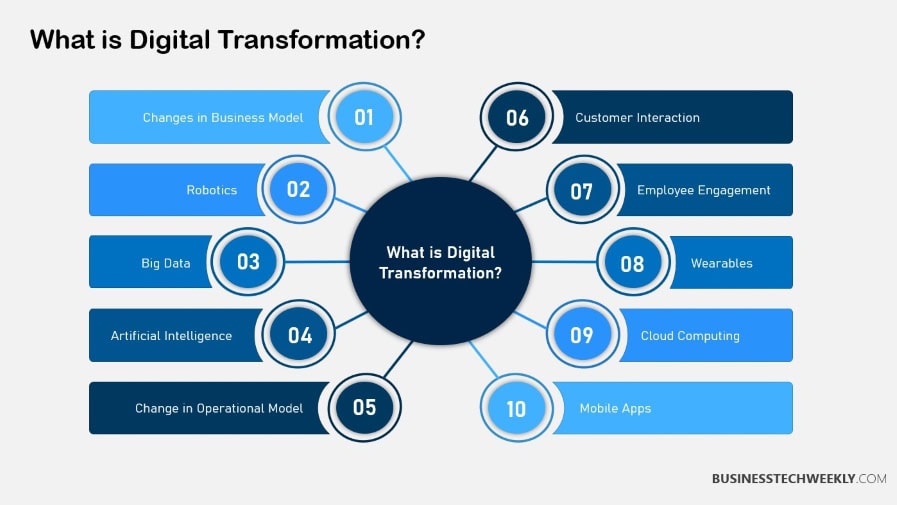
Importance in Modern Business
In today’s accelerating economic and technological environment, digital transformation is not just important; it is imperative to staying relevant.
It enables companies to better anticipate, adapt, and react to competitive market forces, fulfilling new, more complex, and ever-changing customer demands and needs.
Organizations that adopt AI-augmented processes will be the winners. Of those, about 1 in 3 has moved beyond early proof of concept into implementation of limited AI use cases, with the remaining having already integrated AI capabilities into their business.
This transformation continues to fuel innovation and economic growth. It also automates routine tasks, optimizes processes, and frees up human resources for more strategic roles.
AI-powered CRM systems supercharge customer relationship management by automating sales processes and enhancing forecasting. They provide data-driven insights that lead to a broader view beyond the customer-centric model of old.
Finally, through scaling artificial intelligence and developing more robust frameworks for trustworthy AI to flourish, digital transformation establishes a long-term competitive advantage against market entrants.
A survey by the U.S. Chamber of Commerce and Teneo revealed that 98% of small businesses are utilizing AI-enabled tools, with 40% employing generative AI applications like chatbots and image creation to enhance operations.
AP News
Role of AI in Digital Transformation
Artificial Intelligence (AI) is one of the most important drivers of digital transformation. It delivers powerful insights and automation that simplifies complicated processes with ease.
By processing large sets of data, AI technology is able to augment human decision-making, spotting trends and providing insights that drive action.
This ability to share data and information greatly increases efficiency, powering innovation and transformation in multiple industries.
AI can enhance operations by automating repetitive tasks such as data entry. This shifts human resources away from tactical functions, creating more efficient business processes.
AI as a Catalyst for Change
AI serves as an accelerative force to help organizations transform, finding trends and patterns that lead to more data-driven, strategic decisions, faster. It creates operational agility by automating repetitive tasks, like bookkeeping, and encourages an innovative environment.
This culture promotes experimentation and fast-failure prototyping, which helps businesses pivot and adjust at the speed of change.
AI’s capacity to generate customized, relevant content instantly improves the customer experience, orchestrating a 360-degree view of their preferences.
AI’s Influence on Digital Strategies
AI plays a key role in digital transformation by using data analytics to provide insights that inform more efficient and effective targeted marketing efforts. It goes beyond personalizing customer experiences, leading to greater business success.
Moreover, AI-driven solutions improve resource allocation by matching the best initiatives to overall business objectives. By 2024, at least 60% of AI data will be synthetic, highlighting the importance of strategies that leverage these innovations.
Approximately one-third of all organizations have deployed at least some narrow AI use cases, augmenting human decision-making and increasing profits.
Future Prospects of AI Integration
Beyond today, we’re poised for even more impactful AI applications in every industry, creating a future with greater automation and machine learning.
Organizations need to shift their strategies to leverage these new and developing technologies to stay competitive.
The need for ongoing public investment in AI research and development is no less urgent. AI will increase labor productivity by 0.1 to 0.6 percent per year through 2040.
This growth is a testimony to its ability to completely revolutionize business processes.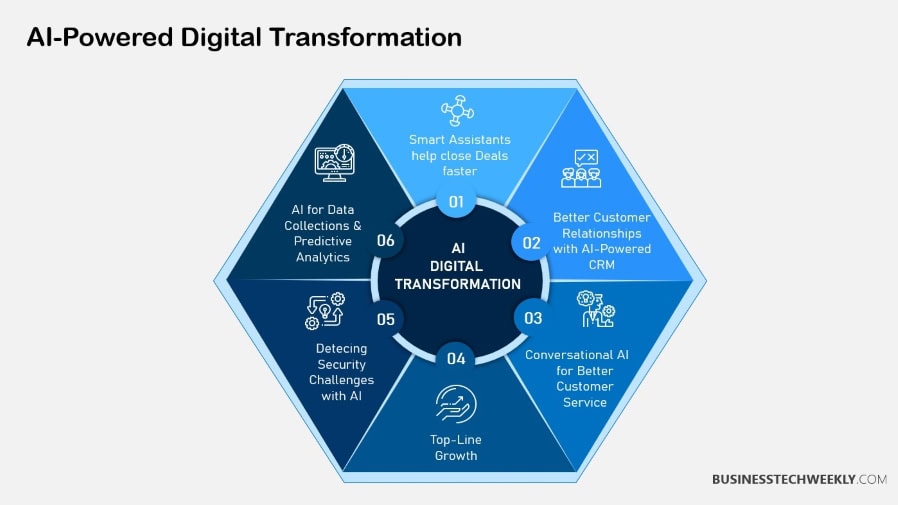
Benefits of AI in Digital Transformation
Artificial Intelligence (AI) is one of the key pillars of digital transformation, driving new levels of productivity and operational excellence across all business functions. AI solutions simplify workflows with the ability to automate repetitive tasks, saving both time and money.
AI systems can also automate data entry, speeding up the process and eliminating human error.
This efficiency frees up employees to focus on more strategic initiatives. This improved efficiency reduces the burden on resources, increases profitability with streamlined workflows and mitigates bottlenecks.
1. Enhanced Decision-Making
AI enables organizations to make more informed decisions with predictive analytics, providing real-time insights that inform business strategies.
By analyzing massive amounts of data, AI reveals insights and trends that would be impossible for a human to find.
This intelligence minimizes the risk of human error, making sure your decisions are precise as well as reliable.
Businesses that take a data-first approach are more likely to achieve their goals and succeed, because AI helps ensure decisions are in line with broader strategic priorities.
2. Improved Customer Experience
AI is revolutionizing customer service by delivering fast, accurate assistance. By delivering highly personalized experiences, AI drives deeper engagement, such as through customized content recommendations that align with users’ unique interests.
By automating routine inquiries through customer service channels, organizations can improve response times, increasing customer satisfaction and loyalty.
AI further cuts through the noise to help identify actionable feedback, informing product and service improvements that better meet customer expectations and increase conversion.
In 2022, 52% of companies allocated more than 5% of their budget to AI-driven digital initiatives, up from 40% the previous year. Additionally, 63% of respondents expect increased investment in AI over the next three years.
DOIT
3. Increased Operational Efficiency
AI is an important part in making workflows more efficient. By automating time-consuming tasks, employees have more time to focus on higher impact work, creating increased productivity across the board.
AI’s resource optimization results in significant savings, making profitability even stronger.
Continuous improvement driven by AI technologies makes sure that businesses stay nimble and cutthroat in today’s lightning quick markets.
4. Predictive Analytics Support
Predictive analytics, one of the most important aspects of AI, predicts future behavior and trends by analyzing data patterns from the past. Businesses use this information to better predict customer behavior and adjust their operations in response to shifting market demands.
This foresight is also invaluable for risk management and strategic planning.
By embedding predictive analytics into day-to-day operations, organizations can make more proactive decisions and put themselves one step ahead of their competitors.
5. Intelligent Automation in Processes
Intelligent automation combines AI with automation to improve the efficiency and effectiveness of business processes. This combination lowers operational costs and improves both speed and accuracy.
By making certain that tasks are performed in the same way each time, businesses can realize a greater level of quality.
Adopting intelligent automation strengthens existing digital transformation initiatives. This strategic positioning ultimately sets enterprises up for long-term business success and resilience in a rapidly evolving digital world.
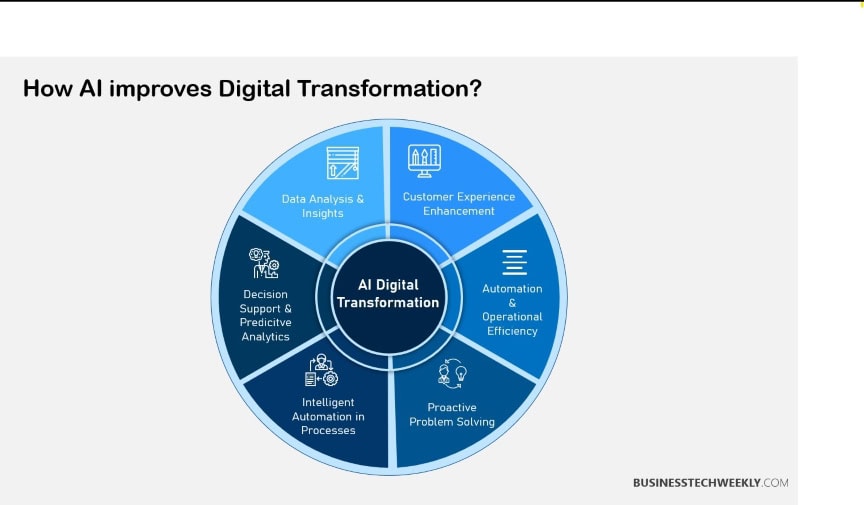
AI’s Impact on Business Operations
The disruptive impact of artificial intelligence (AI) on core enterprise operations and established business processes is deep and far-reaching.
By integrating AI, businesses shift from routine manual tasks to automated processes, allowing for smoother operations that adapt swiftly to market demands.
AI-powered tools are now capable of automating basic tasks such as data entry, scheduling, and customer support.
This further automation is expected to increase growth in labor productivity by 1.5 percentage points per year over the next 10 years. This change year saves a lot of time and precious resources.
Beyond the operational advantages, it positions the businesses to compete in an ever-changing, technology-driven market.
Data Analysis and Insights
AI tools transform the data analysis process by revealing previously hidden insights that give you a strategic advantage. These new tools allow us to analyze information up to 18 times faster.
They rapidly spot trends and anomalies that inform critical business strategies.
Moreover, effective data visualization driven by AI ensures that complex datasets become accessible and easily understood, enabling quicker and more informed decision-making.
To realize these benefits, robust data governance is key to ensure data is high quality and trustworthy.
By emphasizing these areas, companies can position themselves to unlock the full potential of AI. This technology turns data into intelligence—intelligence that drives operational efficiency, ignites innovation, and accelerates growth.
Proactive Problem Resolution
AI enables organizations to predict and prevent emerging problems before they become major concerns.
By proactively monitoring the system, AI identifies and resolves anomalies at the earliest stages, reducing the potential for disruptive disturbances and bolstering the resilience of operations.
This kind of proactive approach has considerable positive impacts to the manufacturing sector and others.
For the facility management industry, AI proactive or predictive maintenance increases equipment reliability and durability.
By fostering an organizational culture that embraces AI-driven insights, organizations can get ahead of the challenges.
This enables them to accelerate the adoption of innovative solutions, fostering resilience and operational excellence.
Automation for Efficiency Gains
Automation, powered by AI, drives major efficiency improvements throughout all aspects of business operations.
By minimizing the risk of human error and making processes more reliable, automation provides uniform, repeatable quality every time.
AI frees up time from busy work. This mutually benefits the employee experience and the employer by enabling employees to dedicate more time and effort to strategic, creative, and higher-value endeavors.
By measuring the impact of automation on their overall business performance, companies can constantly improve processes and free up resources to be used more effectively.
Beyond improving operational efficiency, this shift helps ensure the long-term growth of our business with more predictable, sustainable returns in a more competitive marketplace.
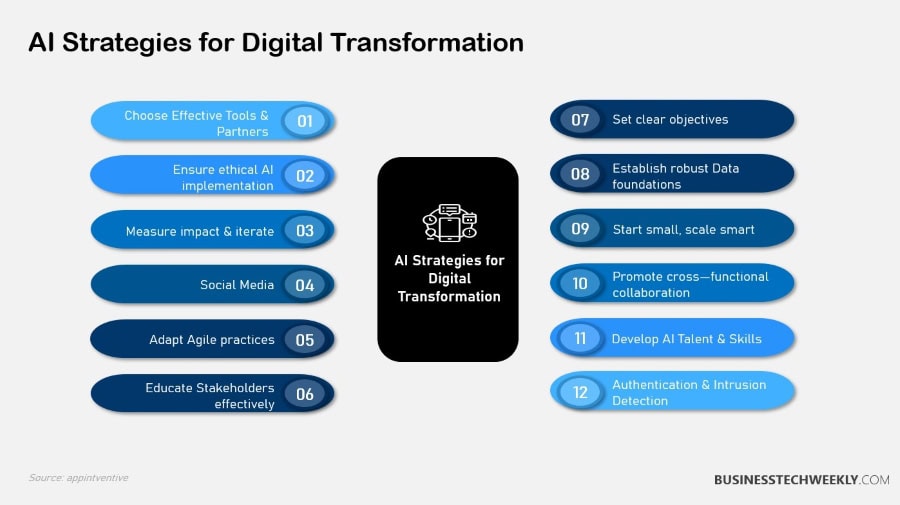
Real-World Applications of AI
AI’s incorporation into nearly every industry has allowed a huge jump in digital transformation, leading to real-world impacts and benefits.
AI diagnostic tools in healthcare are already reading diagnostic medical images with almost miraculous accuracy.
They enable physicians to diagnose diseases earlier, giving patients the best chance for healthy outcomes.
The retail industry is leveraging AI to optimize inventory management and forecast consumer behavior, improving efficiency and customer experience.
Financial services make use of AI algorithms in identifying fraudulent activities quickly which in turn protects assets and increases customer confidence.
The manufacturing sector has also used AI to improve supply chain management, cutting costs and increasing efficiency.
Conversational AI for Customer Service
Conversational AI can be used in customer service through intelligent chatbots that offer 24/7 support.
These AI systems allow for constant availability, making sure that customer inquiries are responded to without delay, ultimately enhancing user experience.
By gathering real-time feedback, anecdotes, and insights, conversational AI allows businesses to continually improve and adapt.
By integrating these tools into their customer engagement strategies, companies can create smoother and more personalized experiences—all while staying one step ahead of a rapidly evolving marketplace.
AI-Powered Customer Relationship Management
AI systems provide deeper insights into customer behavior and help run more personalized marketing campaigns with data-driven analysis.
By automating lead scoring and nurturing processes, businesses can save time to focus on building stronger relationships with potential customers.
By leveraging AI in CRM systems, companies can gain deep insights into what their customers want, when, and how to provide it.
Intelligent Assistants in Sales
By delivering sales teams real-time data, intelligent assistants help them make better informed decisions and optimize their sales strategies.
By automating admin tasks, AI gives sales professionals time back to focus on the sales process.
AI’s ability to seamlessly integrate into sales workflows significantly improves performance, generating better results at a faster pace.
This change further underscores the importance of AI to modern sales strategies.
AI for Security Problem Detection
Cybersecurity AI helps protect our networks and systems by detecting threats in real-time and analyzing patterns to identify potential breaches before they happen.
This zero trust approach to threat prevention and incident response protects organizations from risk before attacks occur and keeps their data safe from exfiltration and degradation.
For organizations looking to protect their digital assets from increasingly sophisticated cybercriminals, investing in AI-driven security solutions is no longer optional – it’s imperative.
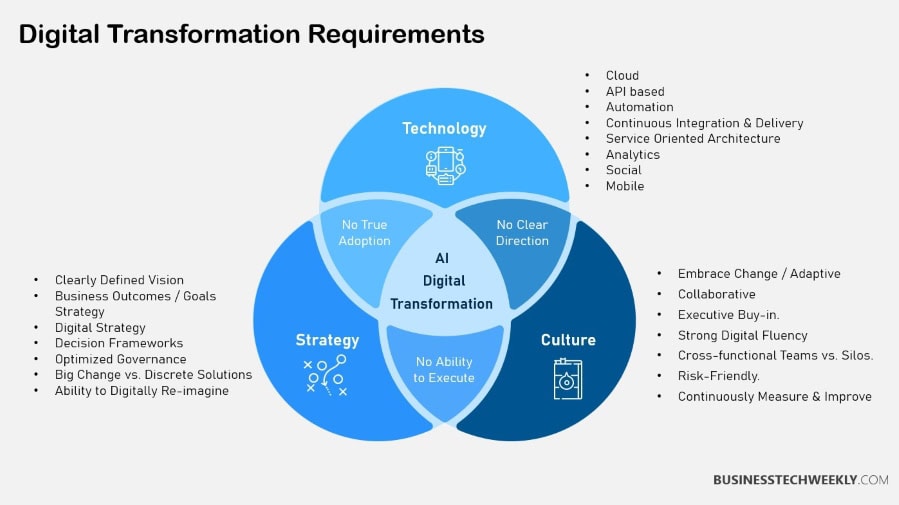
Challenges in AI Implementation
Each organization has its own challenges when it comes to implementing AI technologies.
Yet failed projects are the norm, with unclear goals, lack of data, and lack of resources being just a few of the contributors to a striking 80% AI project failure rate.
To address these challenges, you need to develop a solid plan.
This roadmap should spell out the concrete goals and steps needed to ensure successful AI adoption. This strategic planning process ensures that AI initiatives are closely aligned with overarching business goals.
In doing so, it allows for a more effective transition and increases the likelihood of success.
One of the main challenges organizations face is pushback from their employees who might worry that automation will take over their jobs or change how they work. To address this push back, proactively work with stakeholders and bring representatives of various communities and perspectives into AI conversations.
This proactive approach bolsters the ethical underpinnings of AI initiatives while creating a positive culture of collaboration and acceptance. Stakeholder buy-in is key. It promotes a common understanding, builds teamwork, and creates the environment for more effective AI adoption.
Overcoming Integration Obstacles
Integrating AI into a business’s existing systems and processes is not simple, and success requires thoughtful planning and execution. In order to make sure new AI solutions work with existing legacy systems, start by understanding your existing infrastructure.
Then, determine which ones should be upgraded or adapted. Cross-functional teams are critical to this connection.
They bring together knowledge from various city departments, ensuring that all facets of the business are thought of throughout the AI implementation process.
You need to iteratively test, measure, and improve your AI systems. This proactive approach allows you to address unexpected challenges and adjust the systems to better serve your organization’s needs.
A study by Peil.nl found that 72% of employees who use AI at work believe the technology can double their efficiency.
AI Business
Addressing Skill Gaps
Skill gaps are perhaps the biggest obstacle to effective AI implementation. Personnel need to have, or develop, sufficient in-house expertise to be able to partner with and oversee AI technologies. Training and development opportunities help close skill gaps.
They train employees to understand, control and utilize AI systems.
This is where partnering with educational institutions can be a game-changer for developing AI talent. These alliances open doors to cutting-edge training programs and competitive resources.
So, fostering a culture of continuous learning is key. It also benefits the organization by making it more competitive and better able to stay ahead of the rapid AI advancements occurring in our increasingly digital world.
Managing Data Privacy Concerns
Data privacy is another sensitive aspect of AI implementations. Robust policies are the only way to protect sensitive data and protect us from future security vulnerabilities.
Providing clear, comprehensive guidelines and clearly communicating to customers and stakeholders on how data will be used fosters trust.
This new approach also emphasizes the ethical implications of AI efforts. Meeting data protection regulations is key, making sure the organization stays on the right side of the law and avoids damaging its reputation.
Putting ethical considerations at the forefront of AI development protects privacy. It also encourages smart, sustainable, and responsible development in the AI sector.
Key Points to Consider
From enhancing business processes and driving efficiency to developing innovative applications in the real world, AI has quickly established itself as a necessary tool for success.
There are challenges, but the advantages definitely outweigh with potential opportunities to create jobs and economic development.
- Digital transformation is a comprehensive integration of digital technologies that fundamentally changes how businesses operate and deliver value, enhancing competitiveness and efficiency.
- Digital transformation done right is about supporting enterprise-level business objectives. It’s more than just a technological transformation, ensuring that businesses can pivot as market demands evolve.
- Artificial Intelligence (AI) is at the heart of digital transformation. It has major potential to inform better decision-making with data, automate tedious processes, and increase overall productivity to many business areas.
- AI enhances better decision-making and operational efficiency through its predictive analytics and intelligent automation capabilities. This leads to better customer experiences and real, measurable improvements in business results.
- AI demonstrates its flexibility in practical applications from customer support to cybersecurity to marketing and sales. It reimagines classic business models and workflows alike, serving as a catalyst for innovation and efficiency.
- Organizations need to address integration challenges and skills gaps directly. Beyond this, they must also address data privacy concerns head-on in order to responsibly deploy AI and realize its full potential to transform.

